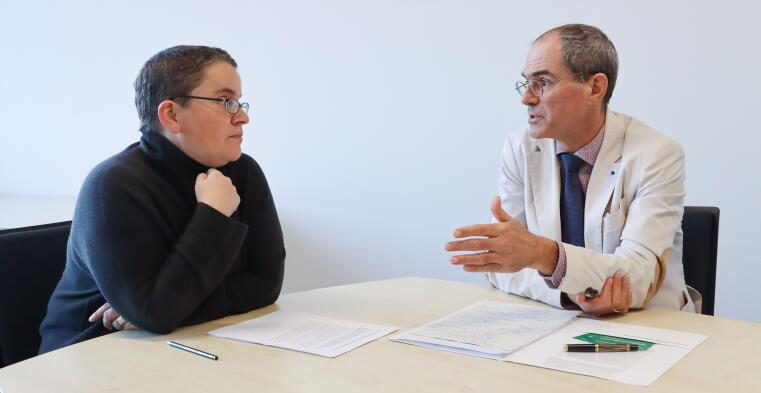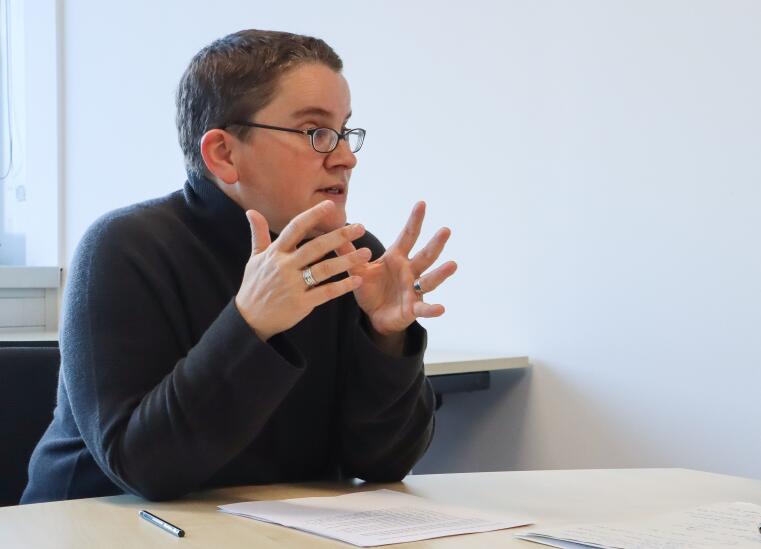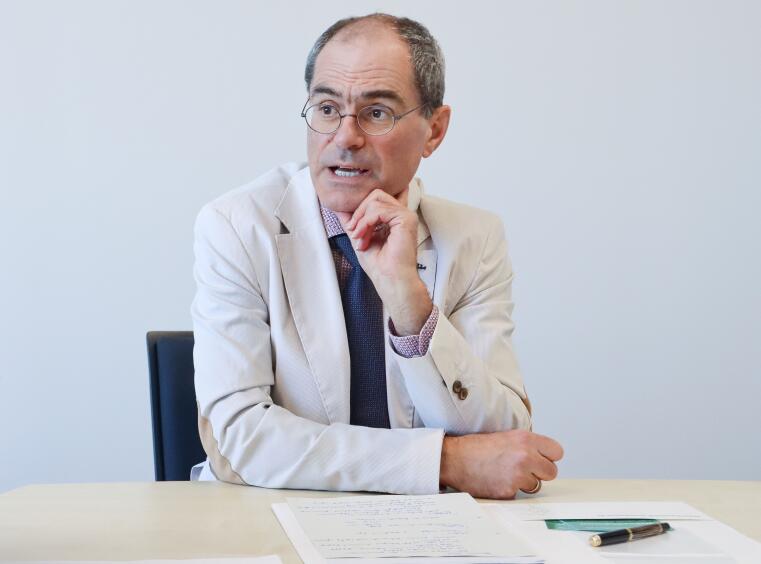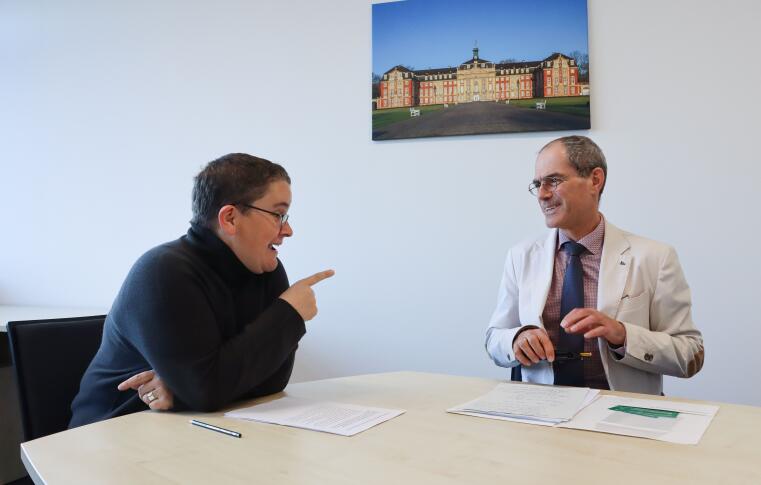“A legal system can comprise countless exceptions”
Interview with Ulrike Ludwig and Peter Oestmann about the annual topic “Exception and Plurality”
Exceptions confirm the rule. This everyday saying sums up a reciprocal and mutually dependent relationship. An exception can only be made by those who recognise the rule; and a rule cannot do without exceptions.
What does this have to do with legal unity and pluralism? A great deal, as has become clear after a year of intensive discussions. With the first annual topic “Exception and Plurality”, the directors of the Kolleg chose a real challenge for the initial phase. The aim was to examine methodologically, but also in terms of the sources, the extent to which the relationship between unity and plurality marks the same or a similar borderline as the relationship between rule and exception. The interview sees historian Ulrike Ludwig and legal historian Peter Oestmann explain the idea behind the annual topic and the initial findings.

In the last interview that we did, the Kolleg was just getting started. Now a year lies behind us full of stays by fellows, discussion rounds and conferences. How have you experienced the work together?
Oestmann: The fact that the Kolleg began almost entirely in a digital form was extraordinarily difficult. That improved considerably with the return to some degree of normality after a few months. Our work was given another big boost in autumn 2022 with the arrival of many new fellows. The situation at the moment is a great motivation for everyone, because there is a very productive and cooperative atmosphere among fellows and staff.
Being director of the Kolleg is very time-consuming, which means having no time for your own research, but the upside is that you meet interesting people and have great conversations. The best thing for me in terms of our events has been the joint discussion of texts, which is always particularly fruitful.
Ludwig: From my point of view, the biggest change compared to the initial phase is that our discussions now have a longer history of argumentation behind them, and have thus reached a new level. We have clarified essential points better, not least how we understand certain terms, and there are fewer misunderstandings. This leads to frequent “eureka” experiences, but also to differences between certain disciplinary perspectives becoming clearer, which in turn leads to further discussions.
Another milestone was the move. The fact that we have been in the same place since October makes an enormous difference. We no longer have to organise meetings; they simply happen. That is the basic idea of the Kolleg, which the new premises have now allowed us to put into practice: to provide space for scholars to work on their own research, while having the chance to discuss issues spontaneously and informally, which gives rise to new common themes. That is gratifying.
The joint work at the Kolleg is brought together into annual topics. Doesn’t that limit scholars’ freedom?
Ludwig: The four annual topics do not impose a rigid corset, but are first and foremost an impulse to organise discussions from a certain perspective. Of course, there will always be other, new, surprising themes that prove to be particularly fruitful. But the point is to find common interfaces with the annual topics, which for me is all the more important because we are looking at very different phenomena in terms of discipline, epoch and geographical location.
Oestmann: The Kolleg’s umbrella theme is quite rightly very broad, since our aim is not to do project research, but to create spaces for discussion. In principle, everyone who is interested in the relationship between law and history is welcome here, which is precisely why we want to narrow the range a little so that we can have structured discussions and conferences. At the same time, it increases coherence among the fellows whom we select, since they have already aligned their proposals with the annual topics when writing their application.

The annual topic for 2021/22 was “Exception and Plurality”. I’m sure some had to think hard about what this might mean.
Oestmann: The underlying idea of the theme was very demanding, perhaps too demanding. The first annual topic could perhaps have explored what legal unity or pluralism actually is. Instead, we explored whether our initial observation – namely, that legal unity and legal pluralism always exist to different degrees – represents a similar interplay as that between exception and rule. Every legal system always has a normal case, the rule, as well as exceptions, which ultimately confirm the rule. And we wanted to examine whether it is the same with the relationship between legal unity and pluralism.
Could it be said that legal unity is the rule and legal pluralism the exception?
Oestmann: Historically, the opposite would be the case: legal unity is the great exception. But we did not intertwine the terms that closely at the substantive level. There is indeed the idea in scholarly law that there are islands of particularity within the sea of Roman law, and that legal pluralism is then integrated by means of exemptions. But that doesn’t work as an overall explanation.
Ludwig: I would also say that the theme was very demanding. But the interesting thing about it is the question of when an exception becomes legal pluralism, and when pluralism is so hemmed in that it only appears as an exception. Exception/rule and unity/pluralism are completely different things, but the relationship between the two is similar: every rule knows exceptions, and exceptions can only define themselves through a rule. They are two sides of the same coin. And it is similar with legal unity and pluralism: when we examine legal pluralism, we are at the same time defining units that constitute this pluralism, and whose own diversity we then no longer look at. And when we explore legal unity, we automatically exclude certain forms of pluralism by defining what belongs to this unity.
Oestmann: So this is primarily a methodological rather than a substantive problem. A law that recognises many exceptions does not become a plural law by, for example, differentiating between adults and children, or by prescribing a 30 km/h speed limit in certain places. A legal system can comprise countless exceptions, which does not create legal pluralism.
It could be claimed that many actual exceptions become legal pluralism over time. Would you disagree with that?
Oestmann: There are different ways of construing exceptions. In pre-modern Europe, for example, there were benefits (beneficien), so-called legal privileges, which prioritised certain groups within one and the same legal system. And then there were privileges, also betterments, which meant that the legal system no longer applied with regard to the privileged. It is only the latter that creates legal pluralism.
Ludwig: The difference is also that an exception remains selective, and that a claim to a future regulation cannot be derived from it. If an exception occurs regularly, then it can be legalised at some point. But an occasional exception to a rule is something different from having a different and privileged legal status that leads to legal pluralism.

Perhaps we should stay a little with examples of exceptions. You mentioned privileges. What about grace?
Ludwig: It depends on the definition. Judging by grace as opposed to judging by law would certainly be an exception. But as soon as grace comes after the judgment, it is no longer an exception; it does not even belong to the sphere of law. From the perspective of people in the 16th and 17th centuries, this cannot of course be so clearly separated and is often negotiated together.
Oestmann: Law is after all there to mark actions according to whether they are permitted or forbidden. But for legal scholars, there are areas that elude this, and grace is one such area, and they therefore cannot decide whether a decision to pardon someone was right or wrong, since the decision does not depend on law.
Ludwig: Although it must be said that there are cases – as an example from Electoral Saxony on the treatment of adulterers shows – where the claim to grace was already inscribed in the law, and had the function here of mitigating punishment (which the person could to a certain extent demand). Such examples show that there the social and historical phenomena being studied are extremely varied. It is not our intention in the end to prescribe certain definitions and say that this belongs to the definition and that does not. Rather, such exceptions trouble us and force us to change our perspective.
Does it also depend on whether an exception is flagged as such?
Oestmann: Modern law actually uses formulations such as “unless” (es sei denn). In this way, it is possible to clarify linguistically what applies if the respective smaller unit does not come into play. For example, the federal states have the right to legislate unless the federal government has the right to do so. This means that the rule applies that the federal states are responsible, even if this is de facto probably not the case in 98% of the laws.
Ludwig: Besides the legal, there is also a colloquial understanding of the concept: a rule is what occurs most of the time, and the exception is the rare case. So it is quantified. That does not have to be the case with a legal approach.
Oestmann: Whereas non-normative sciences such as anthropology do not necessarily look at the laws, but at social practice.

Is it not difficult with a quantifying approach to define the number of cases that constitute a rule?
Ludwig: That is generally difficult. It is easier to define the poles, i.e. the absolute individual case and an area-wide phenomenon. In between, we are dealing with social phenomena that, being interpreted very differently depending on how they are framed, should not be assigned to artificial categories.
Do you have an example of a phenomenon that appears relatively often but is framed as an exception?
Oestmann: The imperial coronations in the Holy Roman Empire. The city of Aachen had claimed to be a coronation city since the Middle Ages. But with every change of ruler in the early modern period, it was declared that this time, for once, the coronation would not take place there. In fact, no coronations took place in Aachen after 1531.
If you now bring all the findings together and draw an interim conclusion: Have you changed your view of the theme in any way, and have you gained new insights?
Oestmann: I believe that we have learned that whether or not legal systems are plural has nothing to do with the relationship between rule and exception within a legal system. Imagine a legal system in which all people are treated unequally. There are numerous exceptions, and it is said: “Everyone is free except for slaves, except for women, except for minors, etc”. This can nevertheless be a uniform legal system. So it is not necessary to create a material bridge from one to the other. That helps to narrow down the theme, even if it sounds like a negative insight.
Ludwig: For me, the biggest insight is that we need to explore more how both exception and rule, and unity and pluralism, are intertwined. By always asking ourselves how these are organised with regard to each other, we can better enter into conversation with one another across time, space and probably disciplines.
The second point is that we have to deal more with historical change. The framework conditions that decide which legal exceptions or which degree of legal pluralism are acceptable in a society change over time. In an estate-based society, it is natural for the better or worse position of certain groups to remain completely unquestioned. This is still the case in the 19th century, but it is then contrasted with the ideal of the equality of all people, which suddenly creates a completely different tension. In the beginning, this ideal of equality excluded women or certain religious groups as a matter of course. So the notion of the human being also changes during this time. But these processes of change do not necessarily lead to improvement. The dictatorships of the 20th century also feature extreme legal exclusion.
Oestmann: I believe that historical change can be seen particularly well in the relationship between exception and rule. If the number of exceptions exceeds the number of rules, then at some point the rule may no longer exist. This could also be taken into account methodologically by exploring whether legal systems are characterised primarily by legal unity or by legal pluralism.
How did the annual topic actually unfold in practice?
Oestmann: On the one hand, there is a series of three special conferences on “Exception and Plurality”, which began in July with a first part on Roman law in antiquity. The second part will focus on the unscholarly and scholarly law of the Middle Ages and the early modern period; the third, on the 19th and 20th centuries, where the history of jurisprudence will probably play a major role.
On the other, our annual conference in September focused on the annual topic, when we began a conversation about the problems raised. Our impression was that the speakers engaged with our questions to varying degrees. Some gave specialised lectures on very different themes from very different fields. It was surprising in a positive sense that we managed to generate a coherent discussion, the fact that all participants were more interested in finding common themes being stronger than the thematic distance between the presentations. In this respect, we can say that, although the annual topic was somewhat too complicated for participants to come together at a theoretical level, the discussions always came back to the core issues.
Ludwig: This also shows that we have to be generous again with the discussion time for future conferences, because that is the most productive part. This will also be reflected in the conference proceedings in that we include audience interventions.
The next annual topic will be “Modes of Standardisation”. What will that be about?
Oestmann: The theme will certainly be more tangible than the previous. Standardisation refers to processes that we want to approach in three ways, especially in the context of the second annual conference. We explore whether legal unity is produced by the enactment of norms, by joint scholarly discussions, or by uniform jurisprudence. In the German tradition in particular, courts were often established before laws were standardised. The Imperial Court, for example, has existed since 1879, but the Civil Code only since 1900.
Ludwig: This theme will also deal more with questions of power. From a historical perspective, it is always also a question of who can enforce laws. On the other hand, we will have to clarify what we actually mean by unity, and how much social inequality legal unity contains. The question is, for example, what changes were brought about in the transition from the corporative or even colonial society to the modern nation state? What effects does the ideal of the equality of all citizens have on modes of standardisation, but also – since certain groups are again excluded – of legal pluralism?
The questions were posed by Lennart Pieper.

